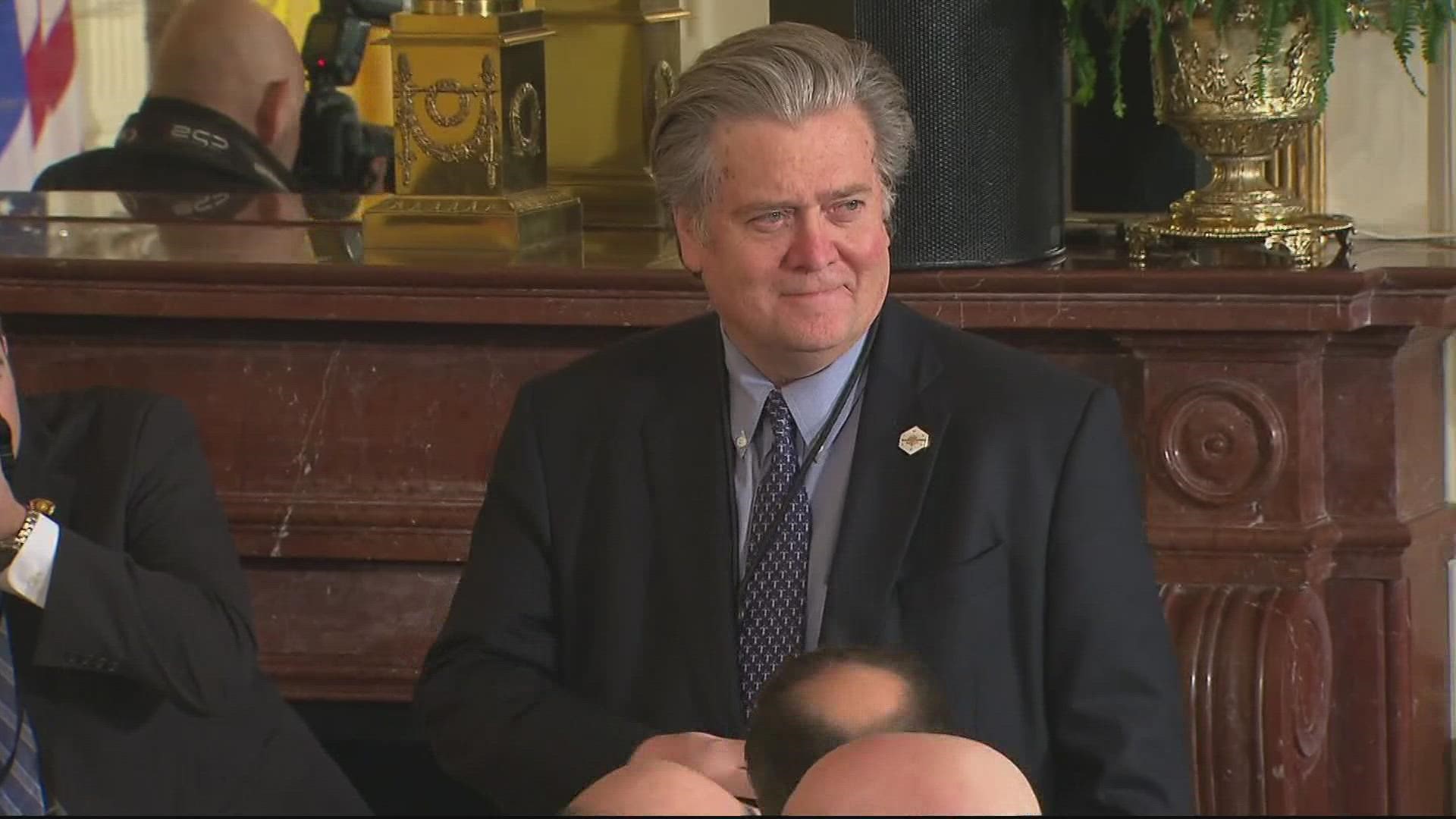WASHINGTON — Prosecutors asked a judge Monday to sentence Steve Bannon to six months in jail and a $200,000 fine, arguing in a sentencing memo that he openly flaunted his defiance of a lawful subpoena from the January 6th Committee.
Bannon, who served as the CEO of former President Donald Trump’s 2016 presidential campaign and then for a brief time as senior counsel to the president, was convicted by a jury in July of two counts of contempt of Congress. Bannon was indicted last year after refusing to turn over documents or appear for a deposition to provide testimony to the January 6th Committee on a number of subject, including his presence at the Willard Hotel “war room” on Jan. 5 “during an effort to persuade Members of Congress to block the certification of the election the next day.”
Following his indictment, Bannon promised to make the case the “misdemeanor from hell” for prosecutors and engaged in numerous public attacks on the Justice Department and the January 6th Committee in the media and his own podcast. He also repeatedly sought to delay the trial, most notably by sending an 11th-hour letter to the committee offering to cooperate just days before opening arguments were set to begin. Bannon’s attorney also claimed in correspondence to the committee and in court filings that he was barred from testifying because of executive privilege – despite multiple letters from Trump attorney Justin Clark informing him the former president had never invoked it on Bannon’s behalf.
All of that, prosecutors said in their memo Monday, demonstrated a “bad-faith strategy of defiance and contempt.” And, they argued, his refusal to provide materials to investigators materially hampered their ability to understand the Jan. 6, 2021, assault on the U.S. Capitol Building.
“The rioters who overran the Capitol on January 6 did not just attack a building – they assaulted the rule of law upon which this country was built and through which it endures,” assistant U.s attorneys J.P. Cooney and Amanda Vaughn wrote in their sentencing memo. “By flouting the Select Committee’s subpoena and its authority, the Defendant exacerbated that assault. To this day, he continues to unlawfully withhold documents and testimony that stand to help the Committee’s authorized investigation to get to the bottom of what led to January 6 and ascertain what steps must be taken to ensure that it never happens again. That cannot be tolerated.”
Under federal statute, Bannon faces a mandatory minimum sentence of 30 days in jail and a maximum sentence of up to 1 year in jail on each count, as well as a fine of up to $100,000 on each count. On Monday, prosecutors argued Bannon should serve six months behind bars – at the top of the recommended sentencing guideline – and should pay the maximum fine of $200,000 “based on his demand to pay the maximum fine in lieu of participating in the standard presentencing financial investigation.”
In their own memo, Bannon’s attorneys Evan Corcoran and David Schoen argued U.S. District Judge Carl Nichols had the authority to waive the mandatory minimum. In lieu of jail time, they asked for a probationary sentence or a term of home detention. And they asked Nichols to stay any sentence he imposed while they appeal the verdict to the D.C. Circuit Court of Appeals.
Nichols ruled before trial that a 1961 D.C. Circuit Court case titled Licavoli v. United States established Bannon could not say he refused to comply with the subpoena under advice of this attorney, Robert Costello. At the time, Nichols said he believed the precedent was outdated – but acknowledged he was nevertheless bound by it as a lower court judge. In their 20-page memo filed Monday, Corcoran and Schoen laid out the defense they would have presented if Costello had been able to take the stand and previewed their expected appeal, which has not yet been filed.
“At the Government’s request and over an objection by the defense, the Court instructed the jury that a conviction under the Contempt of Congress statute did not require that Mr. Bannon believed that what he was doing was wrong,” Corcoran and Schoen wrote. “The Court also prohibited Mr. Bannon from presenting the jury with evidence that he relied on his attorney’s advice in determining how to respond to the subpoena. There was therefore no evidence presented that Mr. Bannon believed that his conduct was unlawful. The jury was not allowed to consider evidence of Mr. Bannon’s state of mind. Mr. Bannon objects to any sentence of incarceration under these circumstances.”
Bannon was scheduled to be sentenced Friday morning at 9:00 a.m. at the D.C. District Courthouse.
We're tracking all of the arrests, charges and investigations into the January 6 assault on the Capitol. Sign up for our Capitol Breach Newsletter here so that you never miss an update.

